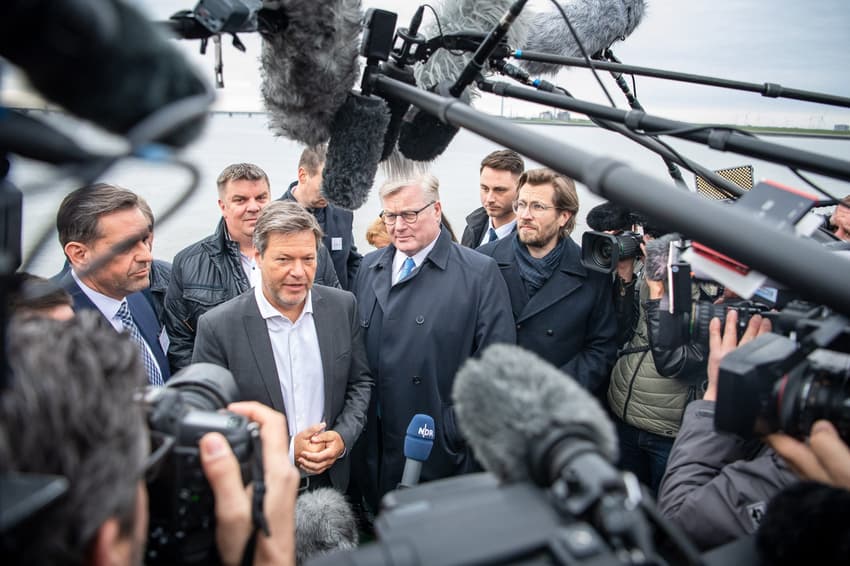German minister warns energy security trumps porpoise habitat

Germany's economy minister has urged environmental activists to avoid filing lawsuits against plans for new LNG terminals, warning that their zealousness to save porpoises could inadvertently strengthen the hand of Vladimir Putin.
Germany is racing to build liquefied natural gas (LNG) terminals to receive gas from farther afield in its bid to quickly turn its back on piped-in Russian energy following Moscow's invasion of Ukraine.
But German environmental group DUH has filed an opposition against the building of terminals at Wilhelmshaven. The group says the construction will "irreversibly destroy sensitive ecosystems as well as endanger the living space of threatened porpoises".
"I am the biggest porpoise fan in the government," said Economy Minister Robert Habeck of the Green party in an interview with RTL broadcaster late Wednesday.
But "your lawsuit would put us in greater dependence" on Russian energy, he warned.
The process of liquefaction makes LNG easier to transport, allowing it to be imported by sea from producer countries that cannot be connected by pipelines, such as the United States or Qatar.
READ ALSO: Germany warns of possible disruptions to oil supply with EU Russia ban
The terminals being constructed are essentially infrastructure for special ships that unload tanks of LNG brought in by sea. They also include equipment for re-gasification, storage and compression.
Germany currently has no LNG terminals as it had counted on expanding its pipeline links with Russia for more energy.
However, Russia's aggression in Ukraine has upended those calculations, and Berlin is now expediting the process to build four LNG terminals.
The first of such terminals should be up and running by the coming winter at the port of Wilhelmshaven.
A second is due to be built at Brunsbüttel, close to Hamburg, by early 2023. The sites for two other terminals are being examined.
Besides concern for marine life, environmentalists are also critical of the plans to ship in LNG, given that it is a fossil fuel, and given the emissions that the transportation of the energy would generate.
"We must not forget that fossil gas is a climate killer. Building new LNG terminals drives us into a fossil dead-end and burns money," Martin Kaiser, who heads the German chapter of Greenpeace, told Rheinische Post newspaper.
But as Germany pivots to sustainable sources to meet its 2045 carbon-neutral goal, the government has said that natural gas is a necessary transition energy source.
With the EU now debating a Russian oil embargo, Habeck has in the last days been psychologically preparing Germans for possible energy disruptions.
On Wednesday, he warned that there could be petrol "shortages" hitting specific regions, including Berlin where 90 percent of oil consumed stem from a refinery that processes Russian oil.
Since the war in Ukraine, Germany has slashed its oil imports from Russia to 12 percent of the total from 35 percent previously.
By Hui Min NEO
Comments
See Also
Germany is racing to build liquefied natural gas (LNG) terminals to receive gas from farther afield in its bid to quickly turn its back on piped-in Russian energy following Moscow's invasion of Ukraine.
But German environmental group DUH has filed an opposition against the building of terminals at Wilhelmshaven. The group says the construction will "irreversibly destroy sensitive ecosystems as well as endanger the living space of threatened porpoises".
"I am the biggest porpoise fan in the government," said Economy Minister Robert Habeck of the Green party in an interview with RTL broadcaster late Wednesday.
But "your lawsuit would put us in greater dependence" on Russian energy, he warned.
The process of liquefaction makes LNG easier to transport, allowing it to be imported by sea from producer countries that cannot be connected by pipelines, such as the United States or Qatar.
READ ALSO: Germany warns of possible disruptions to oil supply with EU Russia ban
The terminals being constructed are essentially infrastructure for special ships that unload tanks of LNG brought in by sea. They also include equipment for re-gasification, storage and compression.
Germany currently has no LNG terminals as it had counted on expanding its pipeline links with Russia for more energy.
However, Russia's aggression in Ukraine has upended those calculations, and Berlin is now expediting the process to build four LNG terminals.
The first of such terminals should be up and running by the coming winter at the port of Wilhelmshaven.
A second is due to be built at Brunsbüttel, close to Hamburg, by early 2023. The sites for two other terminals are being examined.
Besides concern for marine life, environmentalists are also critical of the plans to ship in LNG, given that it is a fossil fuel, and given the emissions that the transportation of the energy would generate.
"We must not forget that fossil gas is a climate killer. Building new LNG terminals drives us into a fossil dead-end and burns money," Martin Kaiser, who heads the German chapter of Greenpeace, told Rheinische Post newspaper.
But as Germany pivots to sustainable sources to meet its 2045 carbon-neutral goal, the government has said that natural gas is a necessary transition energy source.
With the EU now debating a Russian oil embargo, Habeck has in the last days been psychologically preparing Germans for possible energy disruptions.
On Wednesday, he warned that there could be petrol "shortages" hitting specific regions, including Berlin where 90 percent of oil consumed stem from a refinery that processes Russian oil.
Since the war in Ukraine, Germany has slashed its oil imports from Russia to 12 percent of the total from 35 percent previously.
By Hui Min NEO
Join the conversation in our comments section below. Share your own views and experience and if you have a question or suggestion for our journalists then email us at [email protected].
Please keep comments civil, constructive and on topic – and make sure to read our terms of use before getting involved.
Please log in here to leave a comment.